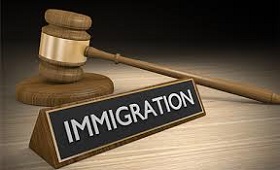Demography, Estonia, Markets and Companies
International Internet Magazine. Baltic States news & analytics
Tuesday, 23.04.2024, 21:06
Estonia's immigration quota for 2020 is 1,314
 Print version
Print version |
|---|
The immigration quota must not exceed 0.1 % of the permanent
population of Estonia in each individual year.
Of the quota for 2020, 28 spots have been reserved for
creative workers, 18 for athletes, coaches, referees and sports officials, and
10 for foreigners arriving in Estonia under an international agreement.
The remaining 1,258 spots are available to foreigners
arriving in Estonia for employment in other fields.
The immigration quota mainly regulates employment and
business related migration from third countries. Included in the immigration
quota are temporary residence permits issued for employment, entrepreneurship
and on the basis of an international agreement.
Not included in the immigration quota are citizens of member
states of the European Union (EU) and the European Economic Area (EEA),
Switzerland, the United States and Japan. The quota also does not include
foreigners moving to Estonia to live with a spouse or close relative, or to
study, work as a lecturer or do research in the country. Also not included in
immigration quota are people who are issued residence permits for permanent
residence in Estonia, major investors, startup entrepreneurs and information
and communications technology (ICT) employees and top specialists.
The immigration quota does not concern people applying for
international protection or people in need of protection and resettled in
Estonia under the EU migration plan.
Where initially the Interior Ministry came up with a plan to
set the quota for employment related immigration for 2020 at approximately 650
people and limit the areas of employment where the quota can be applied to
manufacturing, information and communications, transport and storage, education
and healthcare, while requiring the minister's personal approval in each
individual case beyond that, the proposal was withdrawn following opposition by
several parties.
- 28.01.2022 BONO aims at a billion!
- 30.12.2020 Накануне 25-летия Балтийский курс/The Baltic Course уходит с рынка деловых СМИ
- 30.12.2020 On the verge of its 25th anniversary, The Baltic Course leaves business media market
- 30.12.2020 EU to buy additional 100 mln doses of coronavirus vaccine
- 30.12.2020 ЕС закупит 100 млн. дополнительных доз вакцины Biontech и Pfizer
- 29.12.2020 Lithuanian president signs 2021 budget bill into law
- 29.12.2020 Number of new companies registered in Estonia up in 2020
- 28.12.2020 Для гастарбайтеров и "командированных" уже с 5 января в Латвии будут новые правила игры
- 28.12.2020 Рынок недвижимости Эстонии осенью начал быстро восстанавливаться
- 28.12.2020 Tartu to support students' solar car project








 «The Baltic Course» Is Sold and Stays in Business!
«The Baltic Course» Is Sold and Stays in Business!

